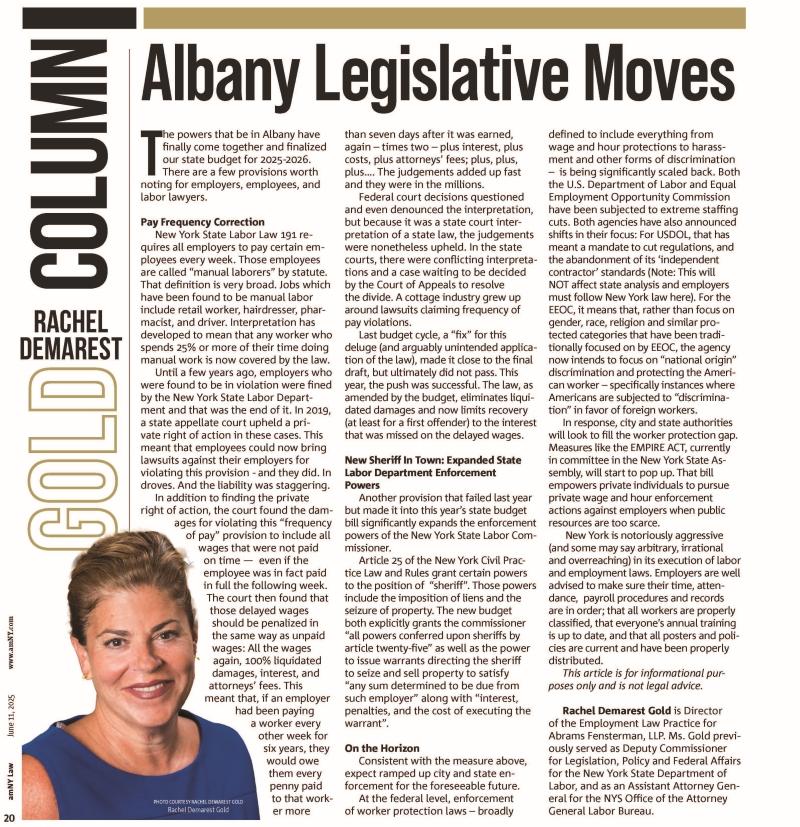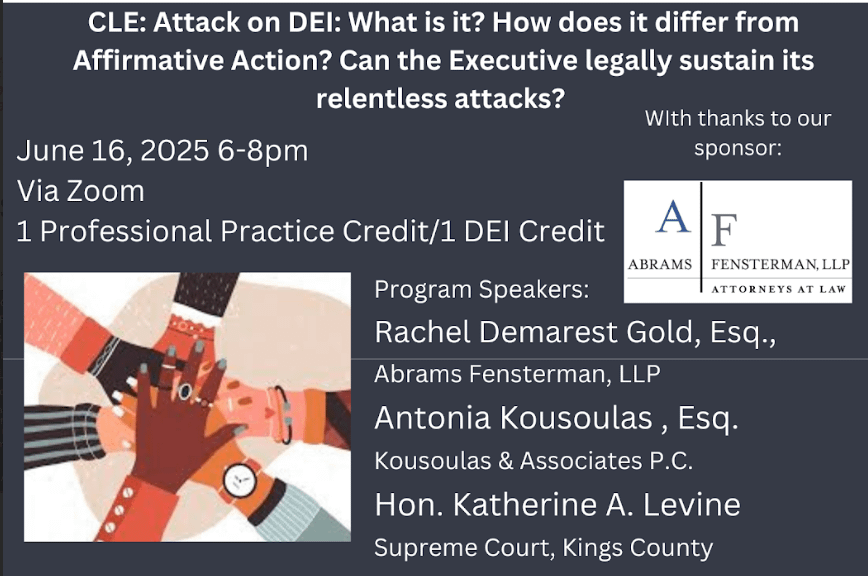By Nancy Levitin, Esq. and Angela C. Bellizzi, Esq.
At the risk of sounding paranoid, the cards truly are stacked against nursing home operators.
What other business is expected to protect a frail and vulnerable population from all types of harm without being guaranteed a source of payment for doing so? Why are nursing homes the only health care providers expected to accept less than payment in full on their receivables? Does any industry evoke such negative bias and assumptions of misconduct as the nursing home industry?
After more than a decade of handling thousands of nursing home collection cases, these questions continue to confound us. Every day we must overcome a myriad of challenges to secure payment for the large number of skilled nursing facilities that we represent.
This article will address two of the most prominent obstacles we face as nursing home collection attorneys: (1) the prohibition against third party guarantees of payment; and (2) debtor-friendly consumer protection statutes.
Inherent Limitations of the Admission Agreement
Many of our clients rightfully believe that the best way to protect themselves from future payment problems is to have a signed admission agreement in each resident’s file. While this is true, a signed admission agreement is not, by itself, a panacea … not by a long stretch.
A signed admission agreement is no guarantee of payment even if it is signed by the nursing home resident or the resident’s sponsor. Residents and sponsors can potentially be held responsible for nursing home bills without a signed admission agreement, and we can plead causes of action against them independent of a breach of contract claim.
Residents are responsible for paying for their care based on a “services rendered” theory of liability. Sponsors, by definition, are “responsible in whole or part” for the resident’s financial support, so we can plead a “necessaries” cause of action against a husband for failing to pay for his wife’s medical care. The challenge is holding someone other than the resident or sponsor responsible for an unpaid nursing home bill.
The prohibition against third party guarantees of payment guides much of what we can permissibly do to get our nursing home clients paid.’ A well-drafted admission agreement is not a third party guarantee of payment.
At most, an admission agreement can require the signer to use his or her access to the resident’s funds and/or documentation to pay the resident’s bill and/or document the resident’s Medicaid application. The logical corollary to this limitation on admission agreements is that, if the signer does not have access to the resident’s funds or personal records, that individual may well have no liability to the facility under a breach of contract cause of action. Third parties acquire the requisite “access” via a power of attorney, joint bank account, or appointment as guardian.
In one case we litigated, the Judge found that a power of attorney who signed an admission agreement could be held liable to a nursing home for a breach of contract if he failed to turn over funds actually received by him that he had the legal authority to use (i.e., under the power of attorney document). 2 The decision made clear, however, that in the absence of proof that the power of attorney had access to sufficient funds belonging to the resident to cover the resident’s nursing home bill, the power of attorney who signed the admission agreement could not be held liable to the facility. Another decision similarly found that proof of access to the resident’s funds was a pre-requisite to finding the signer of an admission agreement liable for the resident’s nursing home bill. 3
In light of these decisions, there are two important considerations to keep in mind when deciding who should sign a resident’s admission agreement:
- If the admission agreement includes releases and authorizations that will assist the facility in securing Medicaid coverage on the resident’s behalf, the resident (if competent) should sign the admission agreement.
- If the resident has a sponsor who has legal responsibility for the resident (e.g., a spouse), as well as a third party who has access to the resident’s funds and documentation (e.g., joint bank account holder, power of attorney, or guardian), and only one is willing to sign the admission agreement, it is more important for the third party to sign the agreement (since the sponsor already has potential liability for the resident’s nursing home bill if the facility can prove that it relied on the sponsor’s credit in providing services to the resident).
In addition to who signs the admission agreement, the facility must exercise care in how the admission agreement is executed:
- If the signer claims to be the resident’s joint bank account holder, power of attorney, or guardian, get proof (e.g., a copy of the bank statement, power of attorney, or court order). The facility should not merely accept the signer’s word as to the nature of his or her status.
- The facility needs to review each page of the admission agreement with the signer, and afford the signer an opportunity to ask questions. Ideally, the signer should initial each page of the contract.
- Every blank in the admission agreement should be filled in by the facility. For example, if the space for the private rate is left blank, the facility will have a difficult time convincing a judge that the signer had notice as to the rate he or she was agreeing to pay.
A signed admission agreement can be an invaluable tool in a nursing home collection attorney’s arsenal. However, not all signed admission agreements are created equal. Only an admission agreement that has the correct language, is signed by the correct party, and is executed using the correct procedures will yield the maximum benefit to the facility.
Protections Afforded to Debtors
Debtors benefit from statutory protections that make the lives of collection attorneys especially challenging. Of particular relevancy are the Fair Debt Collection Practices Act (“FDCPA”), which prescribes the remedies that are available to debt collectors, and a number of other laws that put the funds of judgment debtors beyond the reach of their creditors.
Current depressed economic times have only strengthened the resolve of debtors and their attorneys to more aggressively defend against the efforts of creditors’ attorneys to secure payment of outstanding receivables.
The FDCPA regulates every aspect of debt collection. The law sets forth who the debt collector may contact about a debt; the content, appearance, and timing of debt-related communications, and where a collection action may be filed. The penalties for violating the FDCPA are severe.
For nursing home collection attorneys, the FDCPA’s prohibition against contacting third parties about a debt is of primary concern. The issue derives from an information gap that pervades many nursing home collection cases.
We may get a case where the nursing home suspects that a resident’s son is misappropriating the resident’s Net Available Monthly Income (“NAMI”), but has no evidence that the son accessed the missing income checks. A client may ask us to sue a daughter who has been acting like her mother’s representative, but there is no power of attorney in the file. We may be told that the resident’s niece said she would handle her aunt’s Medicaid application, but we have nothing from the niece committing to filing a timely application with the Department of Social Services.
When these types of cases come to our office, we need to decide whether we can permissibly contact the son, daughter, or niece about the debt owed by the resident to the nursing home. Under the FDCPA, debt collectors are only permitted to contact the “consumer” about the debt.
The FDCPA defines a “consumer” as a person allegedly obligated to pay a debt. Without the consumer’s consent, a debt collector is not permitted to contact anyone but the consumer about the collection of a debt.
Clearly, a resident who owes an outstanding balance on his or her nursing home account is a “consumer” under the FDCPA. As debt collectors we can therefore permissibly contact the resident about his or her unpaid nursing home bill under the FDCPA. The tougher questions arise, however, when it comes to contacting a family member, friend, or other third party about a resident’s debt to the nursing home.
Unless we have evidence that someone other than the resident may have liability for an unpaid nursing home bill (i.e., is a “consumer” under the FDCPA), we can only permissibly contact the resident about the debt.
In the examples above, we could contact the son about the NAMI debt if he was joint on the bank account into which the resident’s income checks were direct deposited. Similarly, we could contact the daughter about the bill if we had proof that she had access to her mother’s funds as power of attorney. If we had a letter from the niece undertaking responsibility for her aunt’s Medicaid application, on which the facility reasonably relied, we could also send her a demand letter without violating the FDCPA. Contacting a third party about a debt without evidence of his or her liability could expose both the facility and our firm to penalties.
After we run the gauntlet of the FDCPA, bring a successful collection action, and secure a judgment in the facility’s favor, our problems are far from over.
Post-judgment, a myriad of legal protections devolve to debtors that protect their income, their bank accounts, and their houses from execution:
- Retirement and disability income, such as Social Security and pension benefits, get special treatment and can never be garnished. Since we cannot reach this income, even if we have a judgment for unpaid NAMI, litigation can never be used to stop a NAMI debt from growing.
- A bank account into which exempt retirement/disability income is direct deposited cannot be restrained unless the balance of the account exceeds the statutory level for execution, and proceedings brought by judgment creditors to overcome any claimed exemption are notoriously difficult to win.
- New York State recently increased the homestead exemption above the $50,000 exemption that was enacted in 2005, so now a judgment creditor cannot execute against a debtor’s equity in property until it exceeds between $75,000 and $150,000 (depending on the county where the property is located) over and above any liens and encumbrances on the property. Legislation is pending to increase the exemption to $250,000 for the downstate counties.
Perhaps the final insult to the nursing home industry, as it attempts to secure payment for care and services rendered to its residents, comes from the judiciary. Civil and District Court Judges in particular often exhibit a jaw-dropping bias against nursing home plaintiffs.
We have seen judges hearing our nursing home collection cases disregard fundamental laws of civil procedure, equity, and fairness. Citing a vague “interest of justice,” they find against the nursing home plaintiff without any compelling defense being mounted by the defendant. In other cases, judges have denied or vacated default judgments against defendants who never even answered our pleadings.
Even though, as nursing home collection attorneys, we represent plaintiffs, we prepare our cases in a defensive mode. We know that, when we step into that courtroom, we are unlikely to be appearing before a judge who is predisposed to find in our client’s favor.
Conclusion
The saying “An ounce of prevention is worth a pound of cure” is never so true as in the context of nursing home collection work. The more nursing homes do on the front end — securing documentation and confirming representations in writing – the greater the likelihood of securing payment down the road. As sad as it is to admit, every new admission is a potential collection action.
1. 10 N.Y.C.R.R. §415.3(b)(1)
2.Prospect Park Nursing Home v. Goutier, 12 Misc.3d 1192 (Civ. Ct., Kings County 2006).
3.Amsterdam Nursing Home v. Lang, 16 Misc.3d 1138 (Sup. Ct., New York County 2007).





